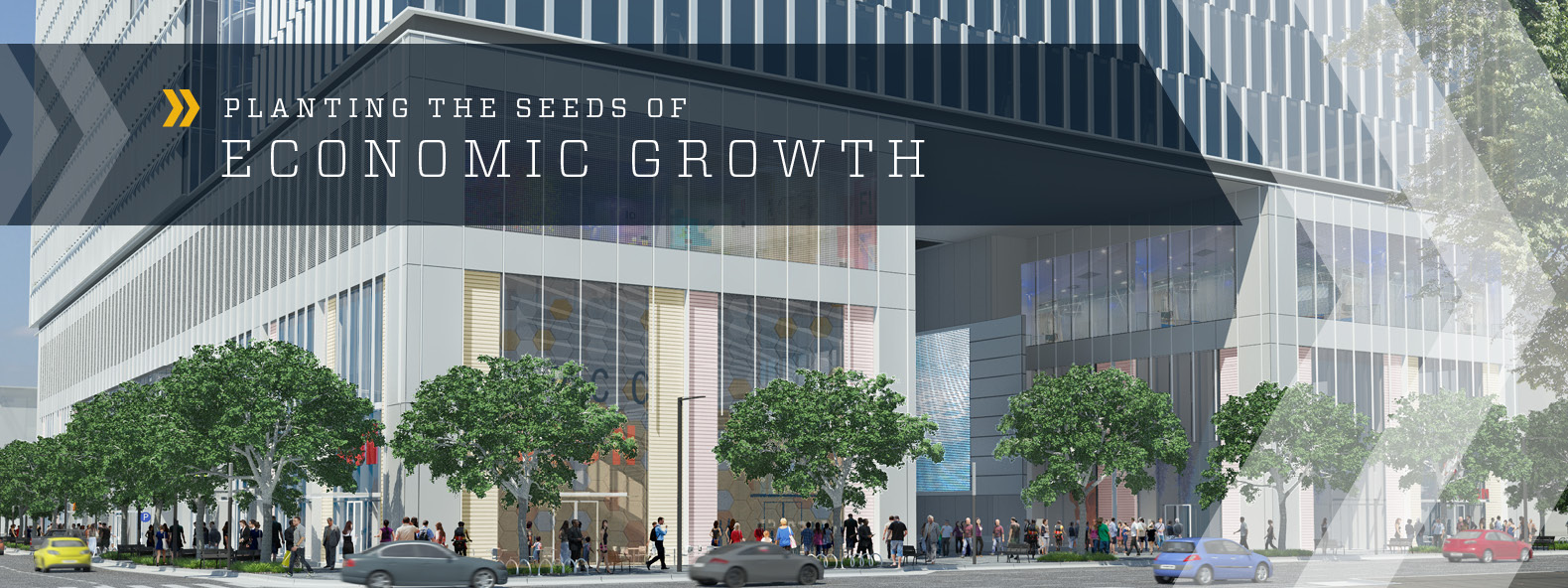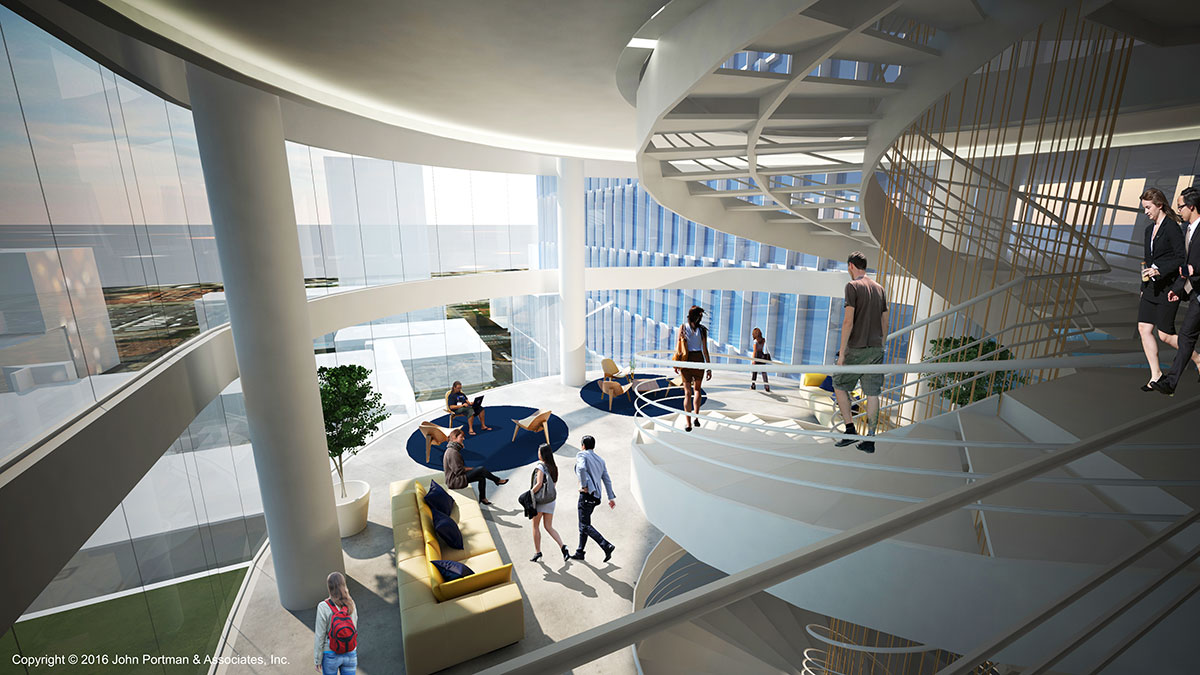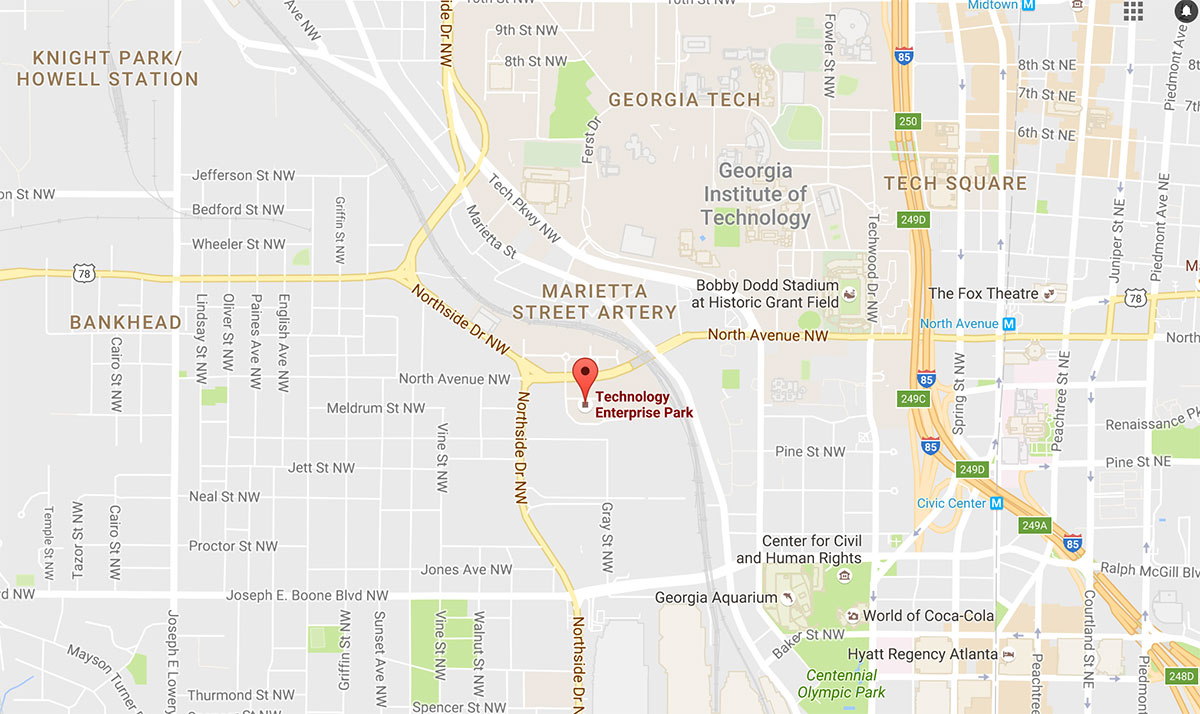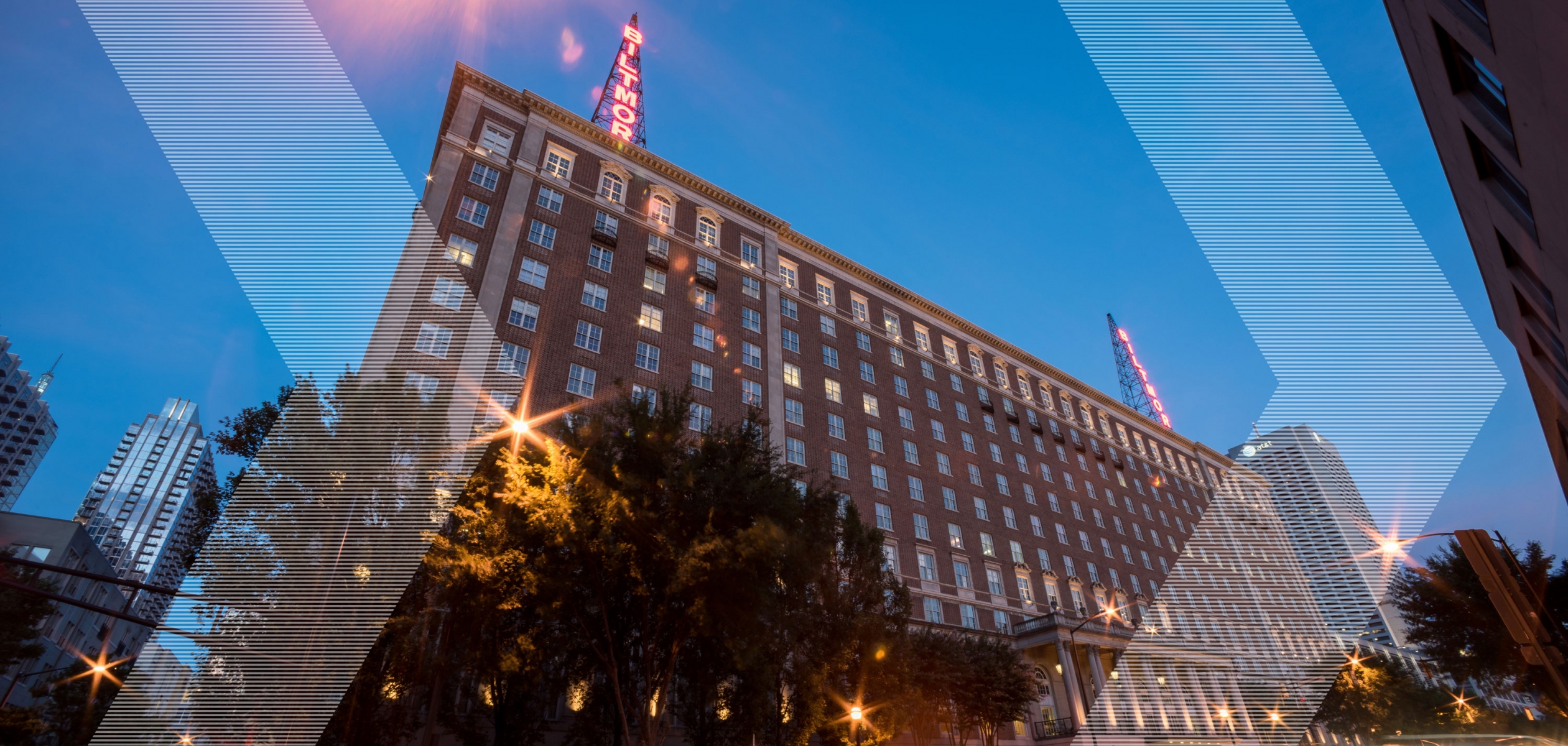
Annual Report Navigation
Planting the Seeds of Economic Growth
The results yielded from Georgia Tech’s research enterprise serve as fuel to drive economic vitality — locally, nationally, and globally. The knowledge created by Tech faculty and students improves quality of life on a grand scale.
Innovation Ecosystem
Georgia Tech, Portman Launch Transformative Coda Project
Last spring Georgia Tech and Portman Holdings announced plans for Coda, an unprecedented collaborative building to be located in Tech Square that will include Georgia Tech’s high performance computing center.

Coda will be programmed around high performance computing modeling, simulation, and a sustainable innovation ecosystem that integrates the existing assets of Tech Square with new opportunities in interdisciplinary research, commercialization, and sustainability. Image copyright © 2016 John Portman & Associates, Inc.
The approximately 750,000-square-foot, mixed-use project just south of the Scheller College of Business represents a $375 million investment into the budding innovation district.
Within the development, 620,000 square feet will be devoted to office space designed to enable unparalleled collaboration between research and industry. Georgia Tech will occupy about half the office space. Nearly 40,000 square feet of retail space, including the adaptive reuse of the historic Crum & Forster building, will be accessed by a plaza, which will become a local gathering place and outdoor living room for Tech Square and Midtown Atlanta. The development also includes an approximately 80,000-square-foot data center, which Next Tier HD has been selected to operate.
“With Georgia Tech as the anchor tenant, the high performance computing center’s interdisciplinary, collaborative environment will enhance Tech Square’s positive impact in Midtown Atlanta, bringing together people in a mixed-use community of innovation, education, and intelligent exchange,” said President G.P. “Bud” Peterson. “Over the past 13 years, Tech Square has become the Southeast’s premier innovation neighborhood.”
“The Portman team is honored to bring to life the vision for this mixed-use property at Tech Square, unlike anything else in the southeastern United States,” said Ambrish Baisiwala, CEO of Portman Holdings. “We’re excited to develop Coda — encompassing collaborative office space, co-working and research facilities, a high performance computing center, and interactive community space, collectively enhancing the innovation ecosystem created by Georgia Tech and Midtown.”
Coda represents the next phase of Georgia Tech’s Technology Square — Atlanta's most sought-after neighborhood for technology- and science-based companies. The new complex will be programmed around high performance computing modeling, simulation, and a sustainable innovation ecosystem that integrates the existing assets of Tech Square with new opportunities in interdisciplinary research, commercialization, and sustainability.
John Portman & Associates is designing the facility in order to achieve the primary goal of bringing research and commercialization together. The design includes the creation of an outdoor urban plaza bordered by retail and a giant interactive media wall, a high performance data center, and two office towers connected by a central collaborative core.
“We believe innovation is generated by looking at things in a different way,” explained Pierluca Maffey, vice president of design for John Portman & Associates. “So we are creating spaces that allow brilliant thinkers, creative minds, and smart business people to come together, share their points of view, and start a process that leads to the next big idea.”

Coda’s outdoor urban plaza will be bordered by retail and a giant interactive media wall, a high performance data center, and two office towers connected by a central collaborative core. Image copyright © 2016 John Portman & Associates, Inc.
Tech Square Expansion Continues With New Innovation Centers
One of the world’s top airline companies and a leading health benefits company opened innovation centers in Technology Square, and a major software firm announced plans to open a new facility in the rapidly growing innovation neighborhood.
DELTA AIR LINES
Delta has invested $2 million to build a collaborative research center, where it plans to enhance operations and improve customer experience by tapping into the knowledge at Georgia Tech. The Delta innovation center is a first for any American university.
“This facility is the first of its kind for the domestic aviation industry,” said Gil West, executive vice president and chief operating officer at Delta. “Tapping into the bright minds at Georgia Tech is an opportunity to gain new perspectives and approaches across Delta for changes that will advance our business now and for years to come.”
Inside the space, Georgia Tech students will have the opportunity to improve Delta’s day-to-day business operations as well as the customer experience.
ANTHEM INC.
As the first Fortune 50 health benefits company with an innovation center in Tech Square, Anthem will be able to tap into Georgia Tech’s existing research and technology, cultivate strategic relationships, and develop opportunities for collaborating with other technology and innovation companies in the area.
The Anthem studio is a state-of-the-art facility housing a multidisciplinary team who will focus on creating new capabilities to enhance the consumer health care experience, improve the quality of care, and lower health care costs. The 6,500-square-foot facility will foster innovation by providing a collaborative environment that brings together industry leaders and technology experts.
“Innovation in health care is a priority for Anthem. By accelerating the development and implementation of new technologies, we’ll deliver a superior, more personalized health care experience for consumers,” said Tom Miller, Anthem’s senior vice president and chief information officer. “We have created a dynamic ecosystem to generate ideas and launch them into the initiatives, solutions, and programs that can help transform health care.”
KEYSIGHT TECHNOLOGIES
Announcing plans to open an innovation center in Tech Square last spring was Keysight Technologies, a leading provider of electronic design and test software, equipment, and services. The project is expected to create more than 200 software engineering jobs.
“We are excited by the opportunities and innovation that our new software development center will generate,” said Keysight President and CEO Ron Nersesian. “Georgia Tech has one of the best engineering programs in the country, and its students bring with them skills and capabilities that will be a great asset to Keysight. We believe that the education, inquisitiveness, and enthusiasm of this new team, under Keysight leadership, will incubate ideas and solutions that will fuel a wide range of next-generation technology innovations.”
Delta, Anthem, and Keysight join more than a dozen renowned companies that have opened innovation centers at Tech Square since 2011. (Emerson, UCB, and Honeywell announced plans for innovation centers in early FY 2017.)
Tech Square connects the intellectual capital of Georgia Tech with the thriving business community in Midtown Atlanta. It is a magnet for tech startups and university spinoffs. The eight-block Tech Square campus will soon total 3 million square feet of commercial space and more than $1 billion invested.
Georgia Tech Foundation to Acquire Historic Biltmore
In the summer of 2016 the Georgia Tech Foundation announced that it had reached an agreement with an affiliate of Novare Group to purchase the historic Biltmore building on West Peachtree Street — across the street from Technology Square.
“The Biltmore is already a vibrant component of what the Georgia Tech Foundation, the Institute, and its partners have previously built in creating the innovation neighborhood of Technology Square,” said Gary T. Jones, chairman of the Georgia Tech Foundation. “This simply strengthens what is one of the country’s most energetic technology ecosystems and is a wonderful example of the connections and collaborations between startups and business leaders and Georgia Tech faculty, students, and researchers.”
“For many years, the Biltmore has served as the historic anchor of Midtown Atlanta,” said President G.P. “Bud” Peterson. “We are proud to be able to incorporate it as a part of Georgia Tech. The acquisition of the Biltmore, combined with the state’s generous support of our business incubator program, the Advanced Technology Development Center, positions Georgia Tech to further expand the number of companies we serve. We look forward to integrating this iconic structure into our growing entrepreneurial ecosystem, where it will help us accommodate additional innovation centers and startups that want to take advantage of the energy, expertise, and technologies at Georgia Tech.”
Technology Enterprise Park Looking to Grow
Plans to transform the 11-acre Technology Enterprise Park (TEP) on the west side of campus into a $500 million mixed-use, industry-focused hub took a significant step forward last year when the City of Atlanta awarded Georgia Tech $100,000 to conduct a feasibility study.
The new funding augments a $460,000 federal grant previously received for the study.
The expanded development will initially encompass about 60 acres and include a cluster of Georgia Tech research buildings on North Avenue and some adjacent properties. Possibilities for expansion beyond this initial stage would see the TEP innovation district extending south beyond the Georgia World Congress Center and including the area immediately surrounding the new Atlanta Falcons stadium.
TEP currently provides 173,000 square feet of multitenant laboratory space in two buildings. The feasibility study will help determine project costs, types of mixed-use activities, and how the development might be integrated into the surrounding area. The University Financing Foundation, Invest Atlanta, and the Atlanta Housing Authority served as partners to Georgia Tech in developing the grant proposal.

Sustainable Growth
Living Building Challenge Team Selected
Georgia Tech selected the team of Lord Aeck Sargent and The Miller Hull Partnership to design the Institute’s Living Building Challenge 3.0 project. The final team was selected after three teams participated in an ideas competition to explore all the possibilities and challenges of designing this certified project, set to be constructed on the Tech campus beginning in 2017.
The Living Building at Georgia Tech is a partnership between The Kendeda Fund and the Institute to build what is expected to become the most environmentally advanced education and research building ever constructed in the Southeast. The Living Building Challenge project will require a great deal of collaboration and the ability to embrace the process all the way through occupation and certification.
“Our team is honored to work with Georgia Tech and The Kendeda Fund to realize the first Living Building in the southeastern United States.”
Brian Court
“Georgia Tech is where I first learned to love architecture as an undergraduate student, so the opportunity to be involved with a project as transformative as this is really an honor,” said Joseph Greco, president of Lord Aeck Sargent and a College of Design alumnus. “We’ve always prioritized sustainable design, but the opportunity to help design and construct a Living Building Challenge 3.0-certified building takes our firm’s abilities to do regenerative design to a new level — one that is grounded in the Southeast but also influential around the world.”
“Our team is honored to work with Georgia Tech and The Kendeda Fund to realize the first Living Building in the southeastern United States,” said Brian Court, partner, The Miller Hull Partnership. “We are excited to join Lord Aeck Sargent and other project partners to leverage Georgia Tech’s research and academic resources in developing a transformative building that models a way toward a more balanced and sustainable built environment.”
Teams from Georgia Tech, Lord Aeck Sargent, and Miller Hull — as well as representatives from The Kendeda Fund — are in the process of analyzing and discussing site evaluations, design considerations, and technologies needed to achieve Living Building Challenge 3.0 certification.
Developing New Innovators
Startup Pipeline Continues at Capstone
As his startup prepared to launch its second product, Partha Unnava turned to Georgia Tech students to help develop an improved medical walking boot.
Unnava’s company, Better Walk, sponsored a team at last year’s Capstone Design Expo, which showcases senior projects that aim to solve industry problems, develop innovative research tools, or launch entrepreneurial ideas.
“I decided to sponsor a Capstone team because Georgia Tech students are the brightest,” he said. “They are focused and hardworking.”
Unnava should know; he used to be a Georgia Tech student. He withdrew from school to focus on launching Better Walk, which redesigned crutches to minimize underarm pain. The crutches were scheduled to be out in fall 2016. His second product – a redesigned walking cast – should be available within the next year, he said.
While many of the more than 100 Capstone projects reflect work to help industry leaders solve problems or find new ideas, last year’s event included a couple of teams sponsored by young startups with strong Georgia Tech ties. This work continues the startup ecosystem Georgia Tech is creating to ensure that students graduate with a strong background in innovation and entrepreneurism.
- Monsieur, a startup co-founded by Georgia Tech graduates, sponsored a Capstone team that created a “robotic bartender” that allows people to order custom drinks — from a selection of some 300 popular cocktails — at the swipe of a screen. Their Capstone team was charged with optimizing the expected profit of the menus according to forecasted demand and creating an inventory policy to minimize associated costs.
- Gimme Vending, which was part of the inaugural class of Georgia Tech’s Startup Summer program in 2014, sponsored a Capstone team to work on keyless entry to vending machines. It is designed to retrofit existing vending machines and replace the existing mechanical cylinder lock.
What's next? ![]() Engaging with the World
Engaging with the World
Annual Report Navigation
(text and background only visible when logged in)

